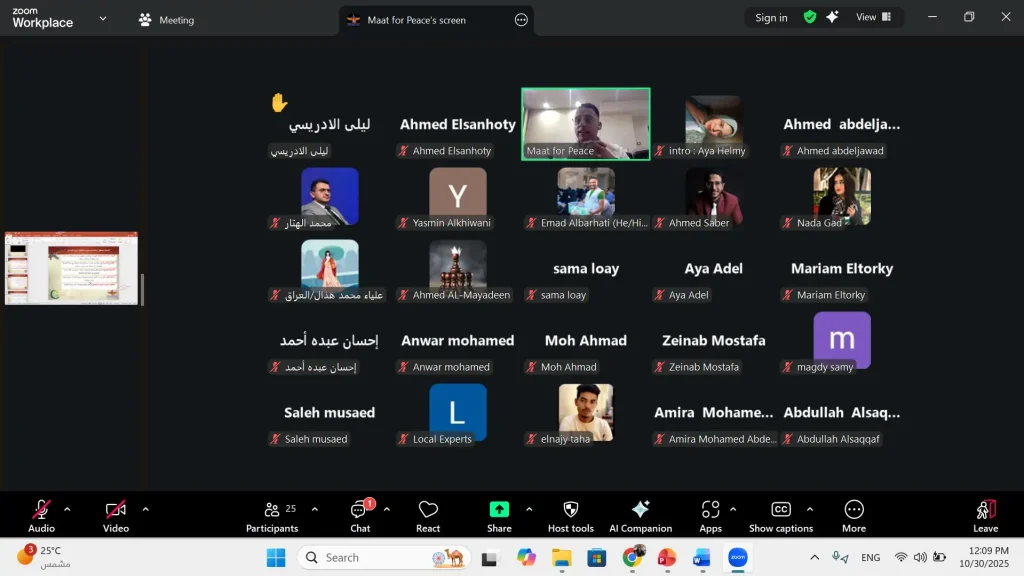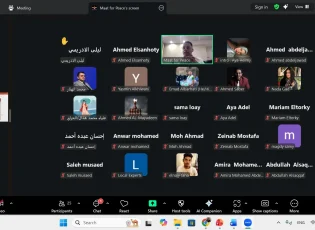In Conjunction with Global Media and Information Literacy Week, Maat Discusses Repercussions of Misinformation on Human Rights in the Arab Region
Maat for Peace, Development, and Human Rights hosted an event titled " Repercussions of Misinformation on Human Rights in Arab Region: Confrontation and Challenges," alongside Global Media and Information Literacy Week. The event explored the impact of misinformation in the digital space on human rights, the challenges faced by media in this environment, strategies for confrontation, the role of alternative media, and the responsibilities of leaders and media professionals in combating media illiteracy and reducing misinformation.
During the event, Palestinian journalist Ahmed Balousha, Managing Editor of Misbar platform, emphasized that misleading news significantly affects the rights of Palestinians, which are violated daily in Gaza Strip. He highlighted the importance of public engagement in countering misinformation, asserting that the fundamental digital right today is the human right to know the truth. He called for enhanced social and ethical responsibility among institutions, individuals, and companies to combat misinformation and verify information.
Dr. Hanan Youssef, Dean of Faculty of Media and President of Arab Organization for Dialogue, remarked that misleading information and deliberate falsification can severely impact national security, especially in the context of artificial intelligence, the information revolution, and cybersecurity. She stressed that information literacy and media awareness have become human rights and a collective responsibility, necessitating the implementation of media education curricula from an early age.
Dr. Sara Fawzy, a lecturer in the Radio and Television Department at Cairo University, noted the global challenge posed by deepfake technology. While acknowledging that complete elimination of this issue is unrealistic, she advocated for strategies to mitigate its damage and risks. Fawzy recommended ongoing awareness campaigns to educate the public on identifying misleading content and urged the allocation of financial resources for media institutions and journalists to acquire software that analyzes misinformation.
Jordanian journalist and content writer Rana AlRabadi emphasized the need to strengthen partnerships among all stakeholders and foster cooperation between governments and technology companies. She called for clear laws and regulations to combat misinformation and hold publishers of misleading content accountable. AlRabadi urged technology companies to develop algorithms capable of effectively detecting and blocking fake news, as well as enhancing tools for the rapid verification of information accuracy.
Ms. Marina Sami, Director of Public Relations and Media Unit at Maat and event coordinator, noted that misinformation and information conflicts pose some of the most severe global risks expected in the next two years. She highlighted how this situation undermines trust in media and governments as reliable sources, exacerbates polarization of viewpoints, threatens civilians during armed conflicts and humanitarian crises, promotes hate speech, obstructs the delivery of humanitarian aid, and hampers peacekeeping efforts in the Arab world.
It is worth noting that United Nations General Assembly decided in 2021 to celebrate Media and Information Literacy Week, noting the need to disseminate factual, timely, clear, accessible, multilingual and science-based information. General Assembly resolution indicated that there is a potential to partially address the large digital divide and the disparity in data within and between countries by improving the skills of individuals to search for, receive and transmit information in the digital domain.
The 2024 Global Media and Information Literacy Week emphasizes the importance of keeping pace with the rapidly evolving digital landscape and the importance of equipping users with the skills to identify, evaluate and engage with information of public interest online. Digital platforms have revolutionized how information is created, consumed and shared, posing new challenges in distinguishing reliable content.
shortlink: https://maatpeace.org/en/?p=43807















